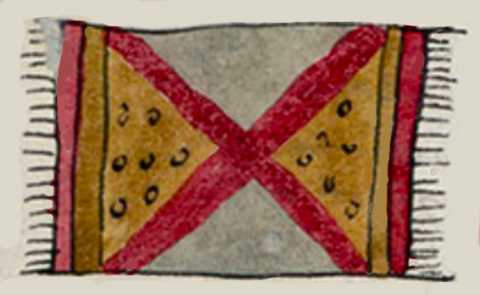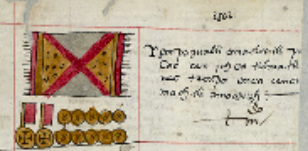ichcatilmatli (CST51)
This painting of the simplex glyph for the term ichcatilmatli (perhaps a woolen blanket, given that sheep are mentioned a lot in this manuscript). It is horizontal and rectangular, with fringe on the right and left ends. It has a large X-shape in the middle and vertical stripes at the ends. This was an object that was needed by the local church.
Stephanie Wood
For more on the Codex Sierra, see Kevin Terraciano’s study (2021).
Stephanie Wood
1550–1564
Jeff Haskett-Wood
textiles, lana, cobijas

ichca(tl), unspun cotton or wool, https://nahuatl.wired-humanities.org/content/ichcatl
cobija de lana
Stephanie Wood
Códice Sierra-Texupan, plate 51, page dated 1562. Origin: Santa Catalina Texupan, Mixteca Alta, State of Oaxaca. Kevin Terraciano has published an outstanding study of this manuscript (Codex Sierra, 2021), and in his book he refers to alphabetic and “pictorial” writing, not hieroglyphic writing. We are still counting some of the imagery from this source as hieroglyphic writing, but we are also including examples of “iconography” where the images verge on European style illustrations or scenes showing activities. We have this iconography category so that such images can be fruitfully compared with hieroglyphs. Hieroglyphic writing was evolving as a result of the influence of European illustrations, and even alphabetic writing impacted it.
https://bidilaf.buap.mx/objeto.xql?id=48281&busqueda=Texupan&action=search
The Biblioteca Digital Lafragua of the Biblioteca Histórica José María Lafragua in Puebla, Mexico, publishes this Códice Sierra-Texupan, 1550–1564 (62pp., 30.7 x 21.8 cm.), referring to it as being in the “Public Domain.” This image is published here under a Creative Commons license, asking that you cite the Biblioteca Digital Lafragua and this Visual Lexicon of Aztec Hieroglyphs.







